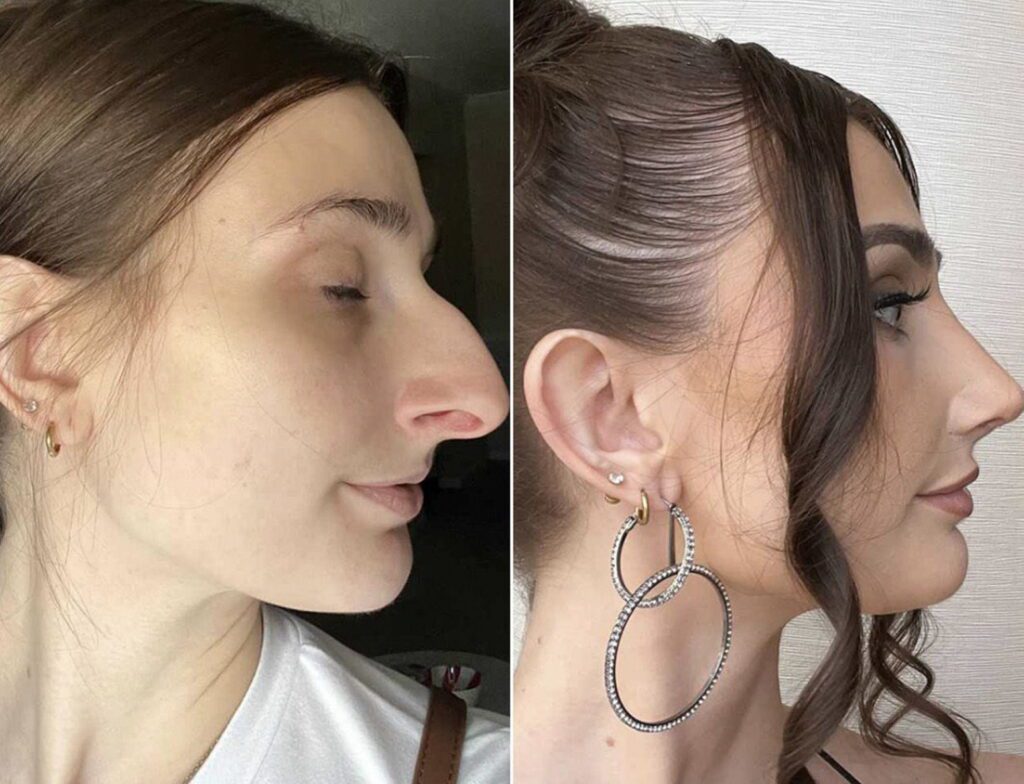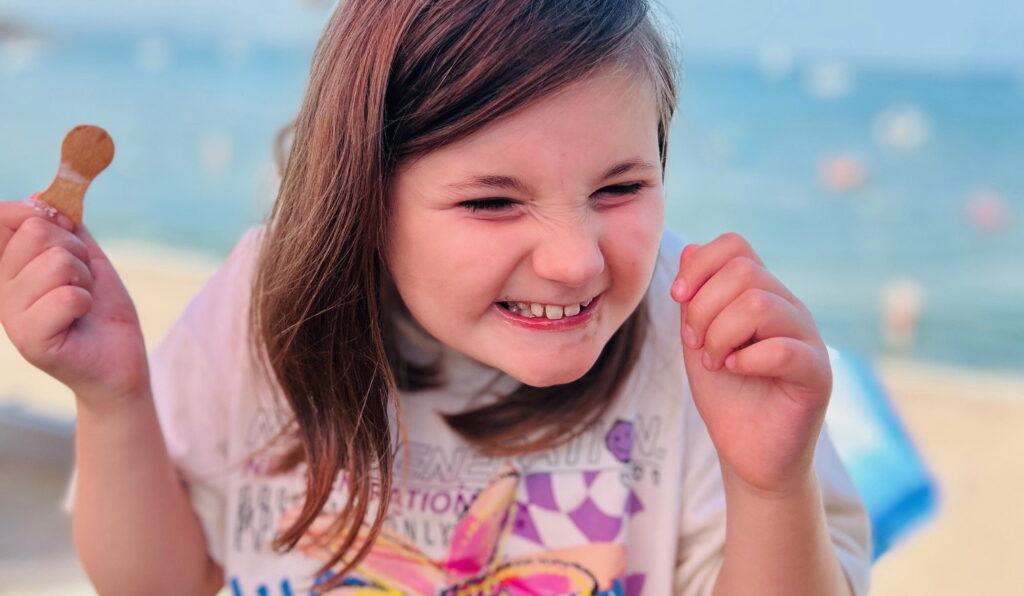“My $11k nose job gave me clarity to ask for a divorce – now I’m glowing”
A woman underwent a post break-up “glow up” and says her $11k nose job helped her get “clarity” to ask for a divorce.
Devyn Aiken, 30, “grew apart” from her husband of seven years and the pair separated two years ago.
But it was after Devyn underwent a nose job that she says it finally gave her the “clarity” to ask for a divorce – after putting herself first.
Now she feels “reborn” and has realised she is “strong” and doesn’t want to “settle”.

It comes after singer Lily Allen revealed during an episode of her ‘Miss Me?’ podcast that she had a boob job after splitting from her actor husband, David Harbour.
Devyn, who works at a drug addiction company, from Philadelphia, Pennsylvania, US, said: “I was re-born in a way [after the nose job].
“I thought ‘I’m choosing myself’.
“I feel so happy.
“You can start over whenever.
“I know what I want now.
“I don’t have to settle.
“Life doesn’t end when you go through divorce.”
Devyn got married at aged 23 and says she felt “stuck” in the marriage but felt she needed to stay in it to “prove” something to society.
She said: “I stayed in a stagnant, unhappy marriage.
“It was wrong just to stay together because of all the time we’d had.
“The last few years we grew apart.
“Everything didn’t align anymore.”


The couple separated two years ago which helped give Devyn the push to do something she had always wanted to do – get a nose job.
Her nose had always been her “biggest insecurity” but she had never found the right doctor to make her “pull the trigger” on surgery.
Devyn said: “Middle school was rough with bullying.
“I was called a witch, toucan, Pinocchio.
“It’s something I couldn’t control.”
After finding Dr Ginsburg on social media she booked in her consultation and underwent the five-and-a-half hour surgery in November 2024 – using her own savings to pay for it.
She spent three to four weeks recovering – and the swelling can take a year to go down fully.
Devyn said: “Having so much down time with my nose job it gave me the time and clarity to think about divorce.
“It made me think ‘I can do this – I’m strong enough’.”
She filed for divorce in December 2024.
She said: “I feel a sense of happiness.
“This is my me era.
“I’m not settling.
“I’m OK to be alone. I’m a strong independent woman.”

Devyn has been sharing her “glow up” on @doseofdevy and has been flooded with comments – and helped inspire others to leave their relationships.
She said: “Someone commented ‘I’m not married but I need a divorce so I can have this glow up’.
“It’s an internal glow – I radiate that externally.
“People have said I look like Bella Hadid, Celine Dion – all sorts.”
Devyn now feels “optimistic” for the future.
She said: “I have my own apartment – I can decorate it like I want it.
“I can have pink bedsheets.
“I’m going out more with my friends.
“I’m going to enjoy life – do some travelling, dating – I’m excited for that.
“I’m optimistic.
“It has been life changing.
“I’m embracing and welcoming the change.”
Girl’s Rare Syndrome Leaves Her Feeling “Trapped in Her Body”
A little girl who would fall over up to 40 times a day was diagnosed with a rare syndrome – which leaves her feeling “trapped in her body”.
Matilda Monerawela, 10, was born with a neurodevelopmental disorder caused by mutations in the CTNNB1 gene – which provides the body with instructions for making a protein for cell development.
Her parents Amy, 40, and Cian, 34, noticed Matilda was behind on her development as a baby – but Amy initially “blamed herself” as a first time mum.
After going back and forth to the doctors since Matilda was around aged one a full exome test revealed her gene mutation when Matilda was aged three.

Now Matilda requires 24-hour care, struggles to communicate, uses a wheelchair because it is so painful for her to walk and has “dangerously violent” outbursts.
The family are fundraising to help a lifechanging drug get to clinical trials. The gene therapy – if it works – could help Matilda walk and talk.
Matilda is just one of 430 known to have CTNNB1 syndrome.
Amy, a speech and language therapist, from Torbay, Devon, said: “A lot of what she does is really held back by her body.
“She is trapped in her body.
“She wants to be like everybody else.
“We want her to be able to go out in the world and do what she wants to do without being reliant on other people.
“And if it works, even if she can regain 50% of her functioning. That could mean that she could have a normal life.”
Amy had a normal pregnancy until the midway point when they noticed Matilda’s head was very small.

Matilda was born on January 6, 2015 after Amy was induced when her Matilda’s heart rate slowed to “dangerous rates”.
Amy said: “We were always certain in the beginning when her development wasn’t quite right, that she had cerebral palsy and that it was birth damage, because when she was born, she was quite lethargic and she didn’t cry.
“In hindsight, things were wrong from the day she was born.”
As a first time mum, Amy said she had “no frame of reference” and “blamed herself” when Matilda was not hitting normal milestones like lifting her head and sitting up.
She said: “She didn’t smile at me, she didn’t look at me. It was really difficult to form a bond with her because it felt like it one way.
“As parents, you feel like you’re doing something wrong, so you blame yourself.
“You go to the parent groups and the baby groups and all the babies are doing these lovely things like rolling and crawling and sitting up and your baby’s not doing any of it. It was very, very isolating, very lonely and very scary.”
Amy said they were not taken seriously by doctors until Matilda was two years old when she started having lots of tests.
Her condition remained a “mystery” after an MRI of the brain showed no sign of injury and her parents assumed Matilda had cerebral palsy.
Amy said: “This was when the fight began. The fight is ongoing, a daily struggle.”

Amy decided to quit her job in human relations and took a course to become a speech and language therapist so she could understand more about how to help her daughter and others.
She said: “You have to become a medical expert.
“You have to learn everything about paediatrics. You become one of those people that doctors dread, but you have to.”
Matilda only took her first steps aged three and a half but due to spasticity in her legs she used to fall 30 to 40 times a day and would often injure herself.
Amy and Cian, a maintenance manager, would cover the lounge with massive fluffy rugs to break her fall.
After years of searching for answers for Matilda’s health a neurologist at Bristol Children’s Hospital suggested a full exome test which was their “final shot” in 2018.
Amy said: “We put her through so much testing and we didn’t want to do it to her anymore. So we said, right, this is the last thing.”
The test revealed her diagnosis which was “lifechanging” but the parents have continued to struggle – as well as Edith, eight, who is a young carer for her sister.
Matilda’s diagnosis helped Amy connect with other parents and get in touch with Spela Mirosevic, a Slovenian researcher who has brought together scientists across Europe and America to create a new drug.
The drug is a type of gene therapy which has already been developed, and it has been recognised by the European Medicines Agency (EMA) and the US Food and Drug Administration (FDA) as a promising therapy.
If they can refine the technology they drug can potentially target any genetic condition.
But the CTNNB1 foundation – who have developed the drug – need £1m to move the treatment into clinical trials.
Amy has set up a GoFundMe to raise £45,000 to fund the “final step” in this gene replacement therapy and hopes that, if the new drug is successful, Matilda may not have to move into a residential school and can stay living with her family.

If the drug works, even at Matilda’s age, her parents say there is a good chance she could walk and talk and that “she wouldn’t have these terrible outbursts or anger” and “could have some independence”.
She said it would also allow for little sister Edith “to have a little bit of her life back.”
By the time the drug gets the funding it needs to help the children, it may be too late for Matilda to make a full recovery but her parents hope the drug will help the next child.
Amy said: “It will help future children. And if a child is born and they’re not really sure why they’re not developing properly, if you give this to a baby and it works to fix the faulty gene, you would be looking at a full recovery.
“It is not just for Matilda, it is for so many other children. They deserve a life that is free of pain and full of opportunity.”
You can donate here – https://www.gofundme.com/f/the-future-of-gene-therapy-starts-here-fund-the-final-step




